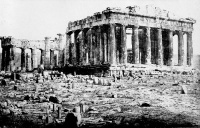Greek primordial deities
From The Art and Popular Culture Encyclopedia
|
Related e |
|
Featured: |
In Greek mythology the Primordial deities are the first entities or beings that come into existence. They form the very fabric of the universe and as such are immortal. These deities are a group of gods from which all the other gods descend. They preceded the Titans, the descendants of Gaia and Uranus.
Contents |
Genealogy and nature
Although generally believed to be the first gods produced from Chaos, some sources mention a pair of deities who were the parents of the group. These deities represent various elements of nature. Chaos has at times been considered, in place of Ananke, the female consort of Chronos. The female members are capable of parthenogenesis as well as sexual reproduction.
The primordial gods are depicted as a place or a realm. The best example is Tartarus who is depicted as the Underworld, Hell, and a bottomless abyss. His sibling Erebus is also depicted as a place of darkness, pitch-black or a vast emptiness of space.
Their mother, Chaos is depicted as an empty void. Other siblings that include Gaia are depicted as Mother Nature, or as the earth. Pontus or Hydros are depicted as the oceans, lakes, and rivers. Chronos is depicted as time and of eternity.
Hesiod
According to Hesiod's Theogony (c. 700 BC):
- Chaos (Void, Air, arche) – (sometimes poetically female)
- Gaia (Earth) – female
- Tartarus (the great stormy Hellpit, which was seen as both a deity and the personification) – male
- Eros (Procreation) – male
Other sources
- Ananke (Compulsion) – female
- Chronos (Time) – male
- Hydros (Primordial Waters) – male
- Thesis (Creation) – female
- Phanes (Appearance) or Himeros or Eros elder (Procreation) or Protogonos (the First Born) – male (sometimes described as a hermaphrodite but addressed as male)
- Physis (Nature) or Thesis (Creation) – female
- The Nesoi (Islands) – female
- Thalassa (Sea) – female
- Ophion (Serpent; often identified with Uranus, Oceanus, Phanes, or Chronos) – male
Alternatively attested genealogy structures
The ancient Greeks proposed many different ideas about primordial deities in their mythology, which would later be largely adapted by the Romans. The many religious cosmologies constructed by Greek poets each give a different account of which deities came first.
- The Iliad, an epic poem attributed to Homer about the Trojan War (an oral tradition of 700 or 600 BC) states that Oceanus (and possibly Tethys, too) is the parent of all the deities.
- Alcman (c. 600 BC) made the water-nymph Thetis the first goddess, producing poros "path", tekmor "marker" and skotos "darkness" on the pathless, featureless void.
- Orphic poetry (c. 530 BC) made Nyx the first principle, Night, and her offspring were many. Also, in the Orphic tradition, Phanes (a mystic Orphic deity of light and procreation, sometimes identified with the Elder Eros) is the original ruler of the universe, who hatched from the cosmic egg.
- Aristophanes (c. 456–386 BC) wrote in his Birds, that Nyx is the first deity also, and that she produced Eros from an egg.
Philosophers of Classical Greece also constructed their own metaphysical cosmogonies, with their own primordial deities:
- Pherecydes of Syros (c. 600–550 BC) made Chronos ("time") the first deity in his Heptamychia.
- Empedocles (c. 490–430 BC) wrote that Aphrodite and Ares were the first principles, who wove the universe out of the four elements with their powers of love and strife.
- Plato in (360 BC) introduced the concept in Timaeus, the demiurge, modeled the universe on the Ideas.
See also


